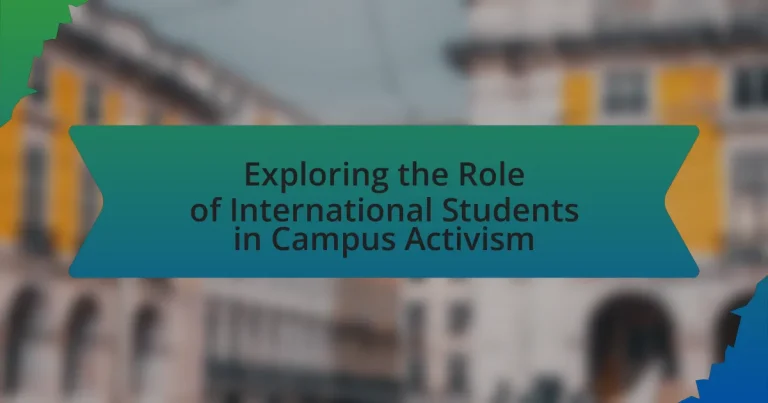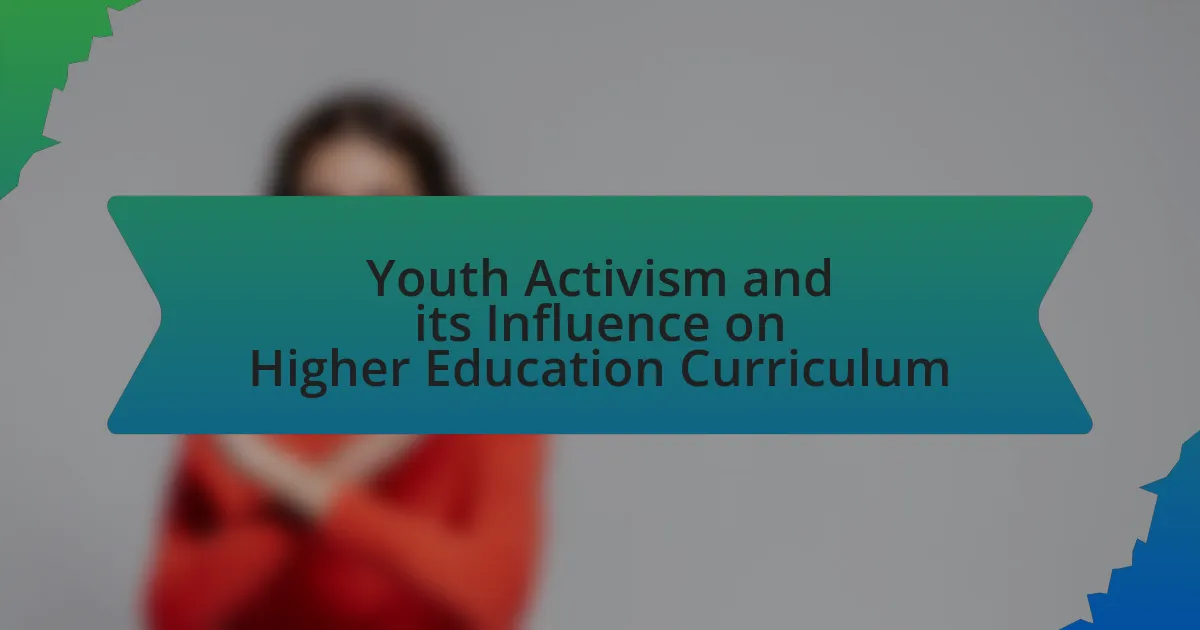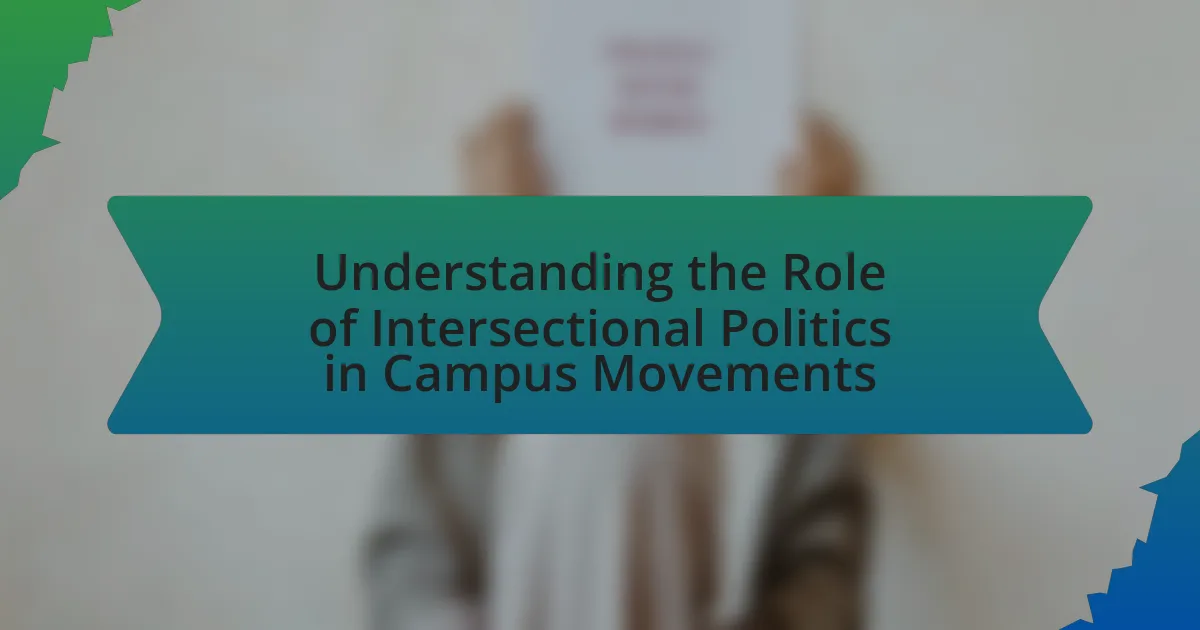The article explores the significant role of international students in campus activism, highlighting their contributions to social movements through diverse perspectives on global issues such as immigration, human rights, and climate change. It examines how these students advocate for equitable access to resources, mental health support, and fair tuition treatment, while also addressing the challenges they face, including cultural differences, language barriers, and legal restrictions. The article emphasizes the importance of their involvement in fostering inclusivity and diversity on campus, as well as strategies for enhancing their participation in activism, such as building coalitions with domestic students and utilizing social media effectively. Additionally, it discusses the support systems available through universities and the role of faculty and staff in facilitating activism efforts.
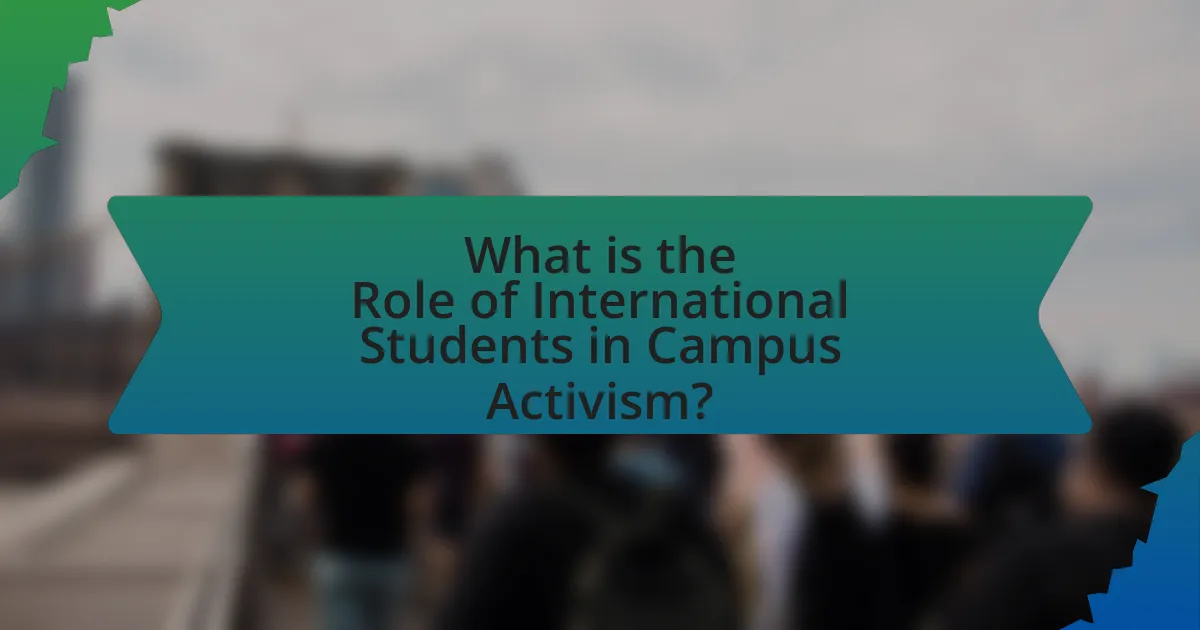
What is the Role of International Students in Campus Activism?
International students play a crucial role in campus activism by bringing diverse perspectives and experiences that enrich social movements. Their unique backgrounds often highlight global issues such as immigration, human rights, and climate change, fostering a more inclusive dialogue on campus. For instance, a study by the Institute of International Education found that international students contribute significantly to discussions on social justice, often leading initiatives that address both local and global concerns. This involvement not only amplifies their voices but also encourages collaboration among domestic and international students, creating a united front for various causes.
How do international students contribute to campus activism?
International students contribute to campus activism by bringing diverse perspectives and experiences that enrich discussions on social justice and equality. Their unique backgrounds often lead to the formation of multicultural organizations that advocate for various causes, such as immigration reform, racial equality, and environmental sustainability. For instance, a study by the Institute of International Education found that international students are more likely to engage in activism related to global issues, thereby fostering a more inclusive campus environment. This engagement not only amplifies their voices but also encourages collaboration among domestic and international students, creating a unified front for change.
What specific issues do international students advocate for on campus?
International students advocate for issues such as equitable access to resources, mental health support, and fair treatment regarding tuition fees. These students often face unique challenges, including cultural adjustment and financial burdens, which necessitate advocacy for policies that address their specific needs. For instance, a study by the Institute of International Education highlights that international students frequently call for improved mental health services tailored to their cultural backgrounds, as they may experience higher levels of stress and isolation. Additionally, they often campaign for transparency in tuition pricing and financial aid opportunities, as many international students pay significantly higher fees compared to domestic students.
How do cultural backgrounds influence their activism efforts?
Cultural backgrounds significantly influence activism efforts by shaping the values, beliefs, and priorities of individuals. For instance, international students often draw from their unique cultural experiences to address issues pertinent to their communities, such as social justice, environmental concerns, or human rights. Research indicates that students from collectivist cultures may prioritize group-oriented activism, focusing on community welfare, while those from individualistic cultures might emphasize personal expression and individual rights. A study published in the Journal of International Students by Perkins and Neumayer (2014) found that cultural identity plays a crucial role in determining the types of activism international students engage in, highlighting the importance of cultural context in shaping their approaches and strategies.
Why is the involvement of international students in activism important?
The involvement of international students in activism is important because it fosters diverse perspectives and promotes global awareness on campus. International students bring unique cultural insights and experiences that enrich discussions on social issues, allowing for a more comprehensive understanding of global challenges. For instance, a study by the Institute of International Education found that international students contribute to campus diversity, which enhances critical thinking and problem-solving skills among all students. This diversity in activism not only amplifies marginalized voices but also encourages solidarity across different communities, ultimately leading to more effective advocacy for social change.
What impact do international students have on campus policies?
International students significantly influence campus policies by advocating for inclusivity and diversity initiatives. Their presence often leads to the implementation of policies that address cultural sensitivity, support services, and academic resources tailored to diverse populations. For instance, universities may establish international student offices or enhance mental health services to cater to the unique challenges faced by these students. Research from the Institute of International Education indicates that campuses with higher international student enrollment tend to adopt more comprehensive support systems, reflecting the need for policies that accommodate a multicultural environment.
How does their participation enhance diversity in activism?
International students enhance diversity in activism by bringing unique perspectives and experiences that reflect a wide range of cultural backgrounds. Their participation introduces varied viewpoints on social issues, fostering a more inclusive dialogue that can address the complexities of global challenges. For instance, research indicates that diverse groups are more innovative and effective in problem-solving, as highlighted in a study by Page (2007) in “The Difference: How the Power of Diversity Creates Better Groups, Firms, Schools, and Societies.” This diversity not only enriches the activism landscape but also encourages collaboration among different communities, ultimately leading to more comprehensive and effective advocacy efforts.
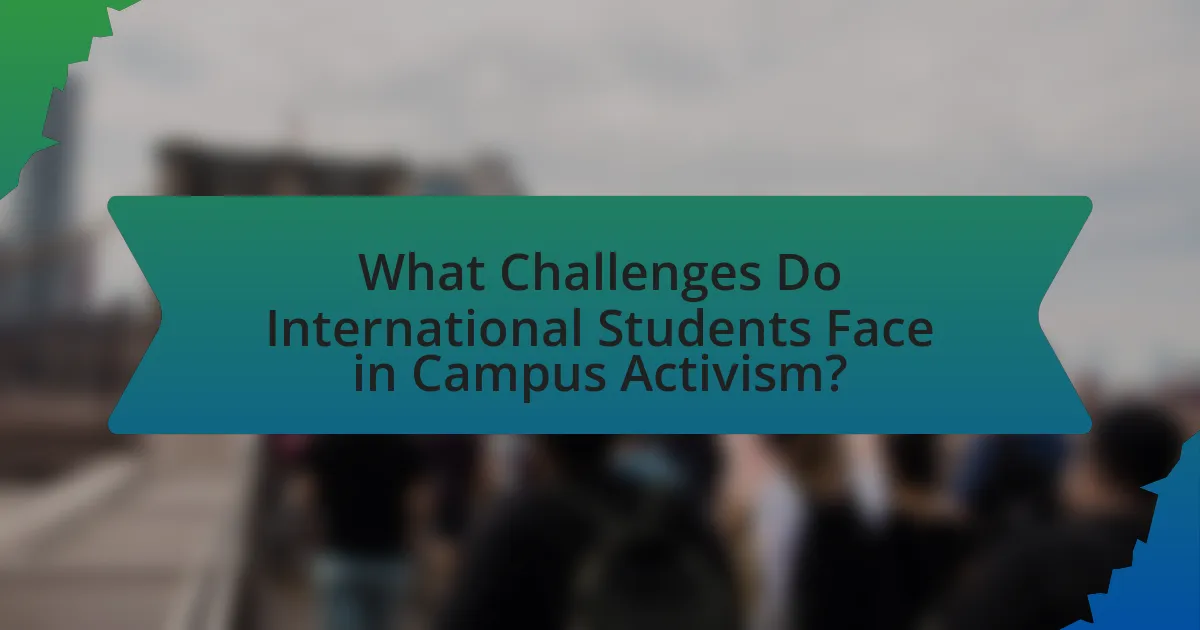
What Challenges Do International Students Face in Campus Activism?
International students face several challenges in campus activism, primarily due to cultural differences, language barriers, and legal restrictions. Cultural differences can lead to misunderstandings about activism norms and practices, making it difficult for international students to engage effectively. Language barriers hinder their ability to communicate ideas and collaborate with peers, limiting their participation in discussions and events. Additionally, legal restrictions, such as visa regulations, may prevent international students from fully participating in political activities or protests, creating a sense of vulnerability and fear of repercussions. These challenges collectively impact their ability to contribute to campus activism meaningfully.
What barriers hinder international students from engaging in activism?
International students face several barriers that hinder their engagement in activism, including language barriers, cultural differences, fear of repercussions, and lack of awareness about local issues. Language barriers can limit their ability to communicate effectively and participate in discussions, while cultural differences may lead to misunderstandings about activism norms and practices. Additionally, many international students fear potential repercussions, such as visa issues or backlash from their home countries, which discourages them from taking a stand. A study by the Institute of International Education highlights that 40% of international students feel uncertain about their rights and responsibilities in the host country, further contributing to their disengagement from activism.
How do language and communication issues affect their participation?
Language and communication issues significantly hinder the participation of international students in campus activism. These barriers can lead to misunderstandings, reduced confidence, and feelings of isolation, which ultimately limit their ability to engage effectively in discussions and activities. Research indicates that students with limited proficiency in the local language often struggle to express their opinions and connect with peers, resulting in decreased involvement in group initiatives and events. For instance, a study by the Institute of International Education found that language barriers are a primary reason for lower participation rates among non-native speakers in campus organizations.
What role does legal status play in their activism efforts?
Legal status significantly influences the activism efforts of international students by determining their ability to participate in political activities and access resources. Students with secure legal status often feel empowered to engage in activism, as they are less likely to fear repercussions such as deportation or loss of visa status. In contrast, those with uncertain or precarious legal status may hesitate to participate due to concerns about their immigration status being jeopardized. For instance, a study by the Institute for Immigration, Globalization, and Education found that international students with stable legal status were more likely to engage in campus organizations and advocacy efforts, highlighting the correlation between legal security and active participation in activism.
How can international students overcome these challenges?
International students can overcome challenges by actively engaging in campus organizations and seeking support networks. Participation in student groups fosters a sense of community and provides resources for navigating academic and social hurdles. Research indicates that involvement in campus activities enhances students’ sense of belonging and academic success, as highlighted in a study by the National Survey of Student Engagement, which found that students who participate in extracurricular activities report higher satisfaction and retention rates. Additionally, utilizing university counseling services and attending workshops on cultural adjustment can equip international students with coping strategies and skills to address specific challenges they face.
What support systems are available for international students in activism?
International students in activism can access various support systems, including university organizations, mentorship programs, and community networks. Universities often have dedicated offices for international students that provide resources such as workshops on advocacy, legal rights, and cultural integration. Additionally, student-led organizations, such as cultural clubs and activist groups, offer platforms for engagement and collaboration on social issues. Mentorship programs connect international students with experienced activists who can guide them in their efforts. Community networks, including local NGOs and advocacy groups, also provide resources and support tailored to the unique challenges faced by international students in activism.
How can universities facilitate greater involvement of international students?
Universities can facilitate greater involvement of international students by creating inclusive programs and support systems tailored to their needs. These programs can include mentorship initiatives that pair international students with local peers, fostering connections and cultural exchange. Additionally, universities can offer workshops and training sessions focused on leadership and activism, equipping international students with the skills necessary to engage in campus activities. Research indicates that institutions with strong support networks for international students see higher participation rates in campus organizations and events, as highlighted in the study “International Students and Campus Engagement” by Zhao et al. (2019), which found that targeted outreach and community-building efforts significantly enhance involvement.
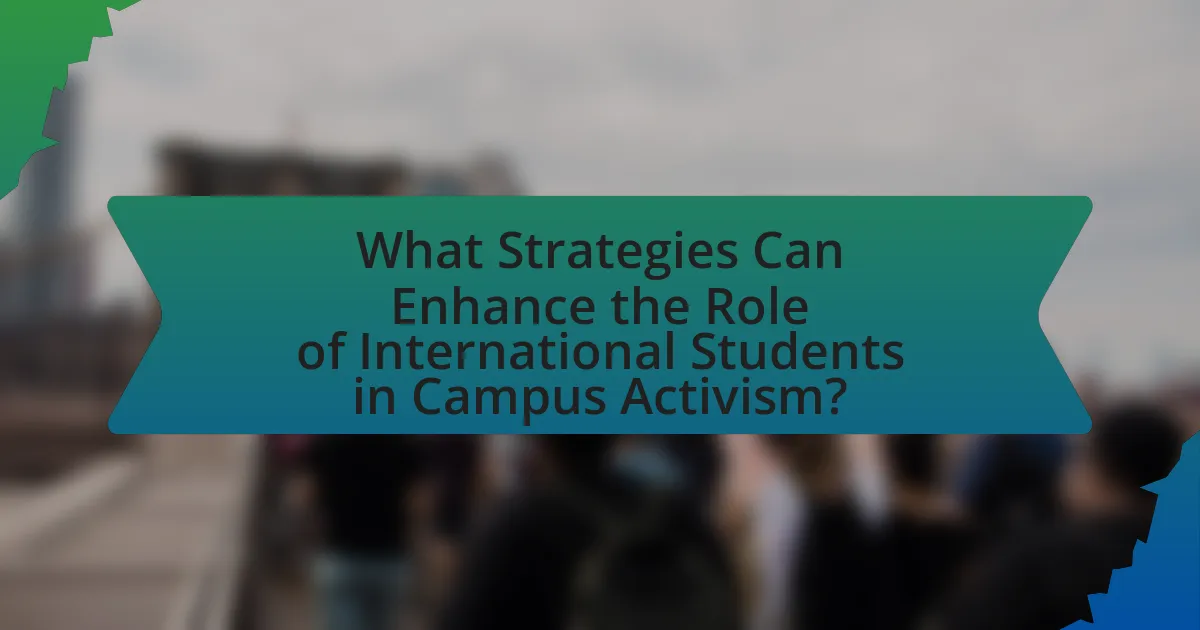
What Strategies Can Enhance the Role of International Students in Campus Activism?
To enhance the role of international students in campus activism, universities should implement inclusive policies that promote engagement and representation. These policies can include creating dedicated platforms for international students to voice their concerns, facilitating partnerships with local organizations, and providing resources for cultural exchange programs. Research indicates that when institutions actively involve international students in decision-making processes, it leads to increased participation and a sense of belonging, as evidenced by a study from the Institute of International Education, which found that campuses with strong support systems for international students report higher levels of activism and community involvement.
What best practices can international students adopt for effective activism?
International students can adopt several best practices for effective activism, including building coalitions, understanding local laws, and utilizing social media strategically. Building coalitions with local and international student organizations enhances collective strength and amplifies voices, as evidenced by the success of groups like the United Nations Association of the USA, which unites diverse student bodies for common causes. Understanding local laws and regulations ensures that activism remains within legal boundaries, which is crucial for maintaining safety and credibility; for instance, knowing the rights to protest can prevent legal repercussions. Additionally, utilizing social media platforms effectively allows for broader outreach and engagement, as studies show that campaigns leveraging social media can increase participation by up to 50%. These practices empower international students to navigate the complexities of activism while making a meaningful impact on their campuses.
How can they build coalitions with domestic students?
International students can build coalitions with domestic students by engaging in collaborative projects that address shared interests and concerns, such as social justice or environmental sustainability. This approach fosters mutual understanding and respect, as both groups work together towards common goals. Research indicates that joint initiatives, like community service or advocacy campaigns, enhance relationships and create a sense of belonging among diverse student populations. For example, a study published in the Journal of International Students highlights that collaborative activism not only amplifies voices but also strengthens community ties, demonstrating the effectiveness of coalition-building efforts.
What methods can they use to raise awareness about their causes?
International students can raise awareness about their causes through social media campaigns, community events, and partnerships with local organizations. Social media platforms like Instagram and Twitter allow for wide-reaching engagement, enabling students to share their messages and mobilize support quickly. Community events, such as workshops or informational sessions, provide opportunities for direct interaction and education, fostering a deeper understanding of the issues at hand. Collaborating with local organizations can amplify their efforts, as these groups often have established networks and resources that can enhance visibility and impact.
How can universities support international students in their activism efforts?
Universities can support international students in their activism efforts by providing resources such as dedicated spaces for meetings, access to funding for events, and training programs focused on advocacy skills. These resources enable international students to organize effectively and amplify their voices on campus. For instance, universities that establish multicultural centers often report increased participation in activism among international students, as these centers foster community and collaboration. Additionally, offering workshops on cultural competency and legal rights can empower international students to navigate the complexities of activism in a new environment, enhancing their ability to engage meaningfully in social issues.
What programs can be implemented to encourage participation?
Programs that can be implemented to encourage participation among international students in campus activism include mentorship initiatives, cultural exchange workshops, and targeted outreach campaigns. Mentorship initiatives pair international students with experienced activists, fostering guidance and support, which has been shown to increase engagement levels. Cultural exchange workshops promote understanding and collaboration, allowing students to share their backgrounds and perspectives, thus enhancing community involvement. Targeted outreach campaigns, utilizing social media and campus events, can effectively raise awareness about activism opportunities, as evidenced by studies indicating that informed students are more likely to participate in campus activities.
How can faculty and staff play a role in supporting activism?
Faculty and staff can support activism by providing resources, mentorship, and creating inclusive environments for dialogue. They can facilitate workshops, offer academic credit for activism-related projects, and encourage student-led initiatives. Research indicates that faculty involvement in activism enhances student engagement and fosters a sense of community, as seen in studies highlighting the positive impact of faculty mentorship on student activism outcomes.
What are the key takeaways for international students engaging in campus activism?
International students engaging in campus activism should prioritize understanding local laws and campus policies to effectively navigate their activism. Familiarity with these regulations ensures that their actions remain within legal boundaries and helps them avoid potential repercussions. Additionally, building coalitions with domestic students enhances their influence and fosters a sense of community, as diverse perspectives can strengthen advocacy efforts. Research indicates that inclusive activism leads to more impactful outcomes, as seen in various successful movements across universities. Furthermore, leveraging social media platforms can amplify their voices and connect them with broader networks, facilitating collaboration and support. Engaging in training workshops on advocacy skills can also equip international students with the necessary tools to articulate their concerns effectively and mobilize support.
